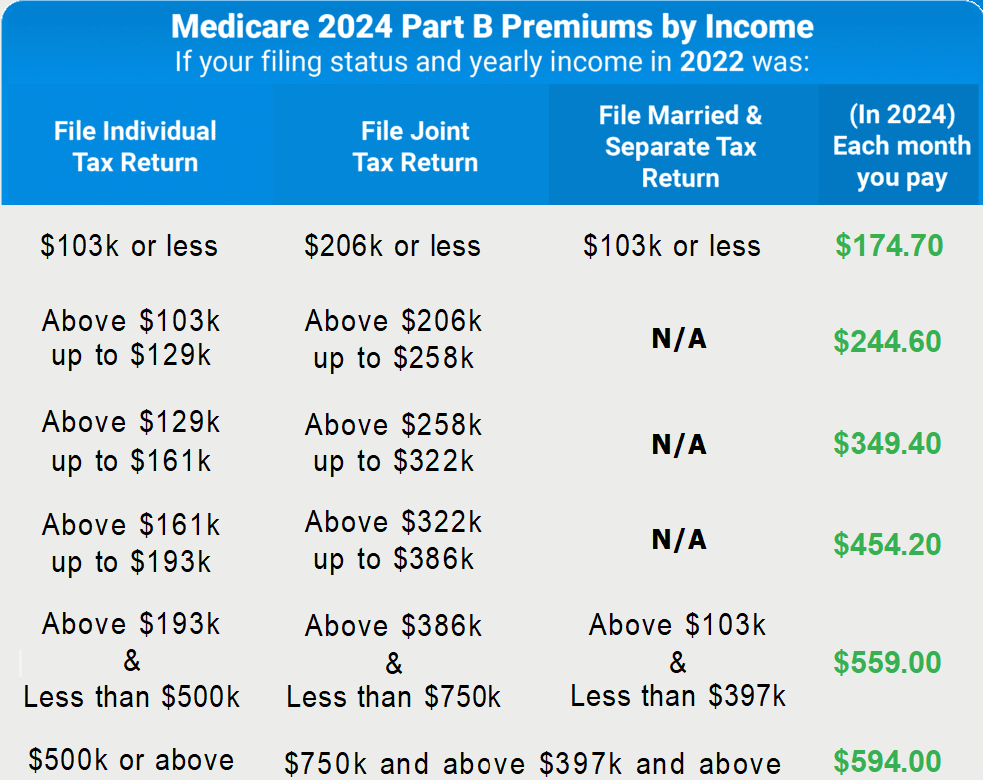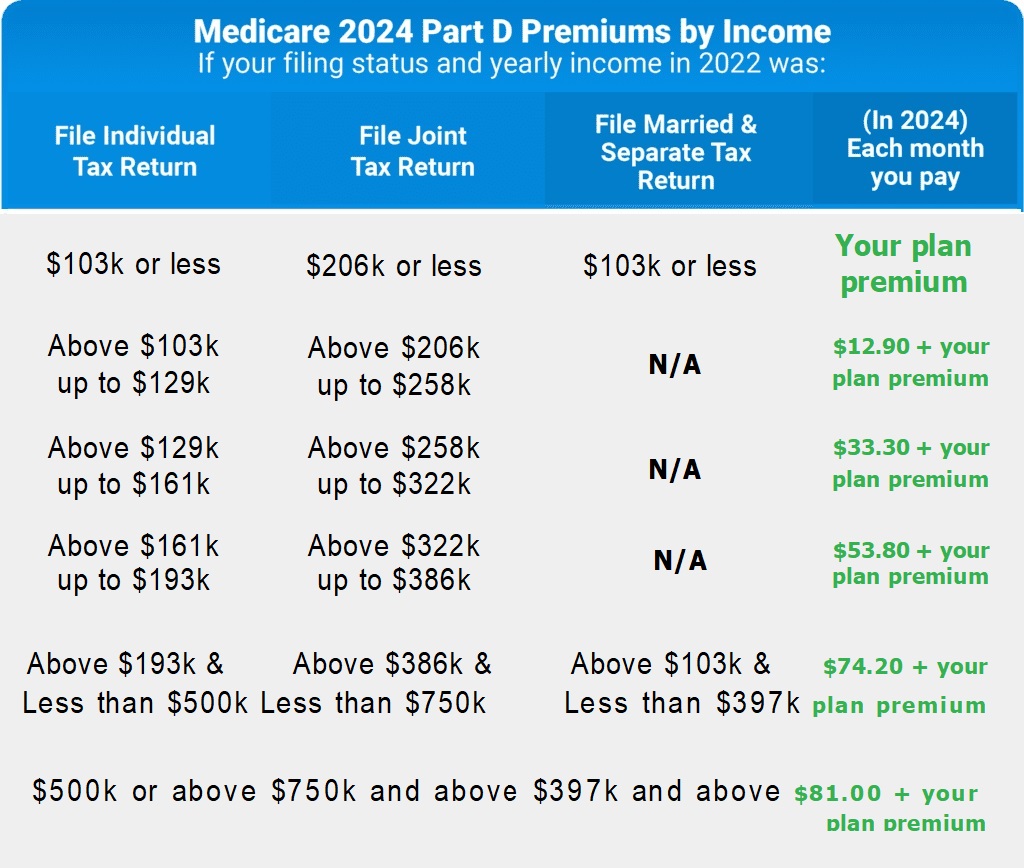When preparing for Medicare, there are numerous factors to consider, ranging from assessing your healthcare requirements to understanding the financial implications it may have on your retirement. One key aspect to focus on is the Income-Related Monthly Adjustment Amount (IRMAA), which can potentially affect the cost of your Medicare Part B and Part D premiums.
Effectively navigating the complexities of Medicare and IRMAA necessitates careful planning. As a beneficiary, it is crucial to comprehend how various sources of income can impact your Medicare premiums. Let’s delve deeper into the intricacies of IRMAA and explore the essential information you need to know as you approach your retirement and become eligible for Medicare.

What is IRMAA?
IRMAA, which stands for Income-Related Monthly Adjustment Amount, is a term associated with the premiums of Medicare Part B and Part D. Annually, the federal government establishes the standard premium for Medicare Part B.
Nevertheless, individuals with higher incomes are subject to IRMAA. If your earnings surpass a specific threshold determined by Social Security each year, IRMAA will impose an additional fee on your monthly premium.
How do you calculate IRMAA?
IRMAA is determined by your Modified Adjusted Gross Income (MAGI), which considers your adjusted gross income. This income is calculated from your tax return from two years ago. Consequently, your 2024 IRMAA will be based on your 2022 tax return.
It is important to note that tax income brackets and Medicare premiums are subject to annual changes, usually taking effect on January 1st of each year. Unlike tax filing, Medicare premiums are applicable per individual. Therefore, both partners may be subject to IRMAA and may have to pay a higher premium.
2024 Part B IRMAA numbers

2024 Part D IRMAA numbers

How Do I Know If I Will HAVE IRMAA?
If your modified adjusted gross income (MAGI) exceeds a specific income threshold, you might become liable for the Income-Related Monthly Adjustment Amount (IRMAA). The specific amounts differ based on whether you are an individual or a couple filing jointly. Social Security will send you an annual letter to inform you if you will incur an IRMAA surcharge.
What is considered in MAGI?
The crucial figure of “Modified Adjusted Gross Income” (MAGI) is determined by considering various income sources. These sources include the adjusted gross income (AGI) from your federal tax return, as well as earnings from wages, self-employment, investments, rental properties, and any other taxable income you may have.
Here is a few illustrations of the income categories that can contribute to your Modified Adjusted Gross Income (MAGI) :
Taxable Social Security Benefits: If your total income, which includes half of your Social Security benefits, exceeds a certain threshold, a portion of your benefits may be subject to taxation and will be included in your Modified Adjusted Gross Income (MAGI).
Retirement Distributions: Withdrawals from tax-deferred retirement accounts such as 401(k)s and traditional IRAs will increase your MAGI. However, distributions from Roth IRAs are typically not counted towards your MAGI.
Capital Gains: Any profits obtained from the sale of investments like stocks, bonds, or real estate can potentially impact your MAGI.
Rental Income: The income you earn from rental properties, after deducting allowable expenses, can have an effect on your MAGI.
Interest and Dividends: If your interest and dividends from investments are taxable, they can influence your MAGI.
Foreign Income: Income earned from abroad, such as pensions and rental income, may be included in your MAGI.
Trusts and Estates: If you receive distributions from trusts and estates that are considered taxable income, they can affect your MAGI.
It’s important to always refer to the most current IRS guidelines and Medicare rules when calculating your own MAGI.
When do I need to worry about IRMAA?
As previously mentioned, IRMAA relies on your tax return from two years prior. The Social Security Administration retrospectively reviews this information, typically at the start of each year, to ensure that your Medicare premiums accurately correspond to your latest income.
I Received an IRMAA Letter?
If you suspect an error in the calculation of your IRMAA, it is advisable to consider appealing the decision. In case you meet the eligibility criteria for a life-changing event, you can utilize Form SSA-44 to initiate the appeal process. Various life events such as marriage, divorce, the passing of a spouse, reduction in work hours, retirement, and others are taken into account by the Social Security Administration when reviewing appeals.
Can IRMAA be appealed?
If you are notified about an IRMAA surcharge and wish to appeal, you can utilize Form SSA-44 to do so. Simply fill out the form and submit it to your local Social Security Office for processing. It is important to note that this appeal must be completed within 60 days of receiving the IRMAA notice.
In the event that you miss the deadline, you still have the option to submit an appeal. However, it is advisable to provide a thorough explanation for the delay along with any pertinent details that will strengthen your appeal.
Will I Know If My Appeal Has Been Approved?
The processing time for decision-making by Social Security is not consistent. The duration for them to handle an IRMAA appeal can extend up to 90 days. Nevertheless, you have the option to contact them for any updates. Upon the approval of your appeal, you will be notified through mail, and Social Security will reimburse you for the extra amount you paid towards your premium.
Paying IRMAA
Beneficiaries typically receive a quarterly invoice for their Medicare premiums, which means that the initial IRMAA charges may also be billed on a quarterly basis.
If you are liable for an IRMAA charge, it is possible that the bill will be sent separately from your usual Medicare premium bill. Rest assured, these charges will eventually synchronize and be consolidated.
Social Security’s consistency is questionable as it undergoes annual re-evaluations. Consequently, a beneficiary may face the possibility of being subjected to IRMAA charges in subsequent years, even after a successful appeal. In such cases, the beneficiary should promptly file another appeal while ensuring the timely payment of their bills to prevent any interruptions in premium coverage. If the subsequent appeal is granted, a refund will be issued accordingly.
What about Social Security Benefits?
If you are currently receiving Social Security benefits and have an IRMAA surcharge, you have the option to deduct it from your monthly check, similar to how you pay for your Part B premium.
Is Paying IRMAA Forever?
IRMAA is not a permanent punishment. It undergoes an annual reassessment, taking into account your tax return from two years ago. Therefore, if your income drops below the specified threshold, your IRMAA can be reduced or even eliminated entirely.
Furthermore, you have the option to appeal IRMAA each year if you believe you meet the criteria for a life-changing event and can provide supporting documentation. A decrease in income can significantly strengthen your appeal and increase the chances of a successful outcome.
Plan Ahead
As you navigate the path towards retirement and healthcare financing, it is important to be proactive and employ various strategies to navigate the complexities of these financial matters.
If you suspect that you may be subject to IRMAA surcharges, it is advisable to initiate the appeal process early and allocate funds to cover any potential costs while your appeal is being processed. This approach can help alleviate any financial strain, provide a sense of fiscal stability, and potentially facilitate a smoother appeal process.
Additionally, it is crucial to consider your individual timeline for Medicare enrollment and plan ahead accordingly. This may involve making decisions such as selling a property, relocating, managing withdrawals from retirement accounts, and implementing other financial strategies.
While IRMAA can be intricate, there are proactive steps you can take to prepare for it. By understanding the calculation, impact, and appeal process, you can make informed decisions that ensure your healthcare coverage aligns effectively with your financial situation.
Takeaways
The IRMAA surcharge is recalculated every year using your IRS tax return from two years ago. Therefore, if your income drops below the threshold, you may see a decrease or elimination of the IRMAA surcharge. For Medicare beneficiaries, IRMAA charges are usually billed quarterly and may come separately from your regular Medicare premium bills. It is important to continue paying these bills even if you are in the process of appealing to ensure uninterrupted coverage. To effectively navigate the complexities of IRMAA, it is advisable to start the appeals process early, allocate necessary funds, and carefully consider financial decisions. Taking a proactive approach can help you manage IRMAA more effectively.
 Mario Arce
Mario Arce
I have been working with Medicare clients since 2016. I serve California members in San Bernardino & Riverside county.

